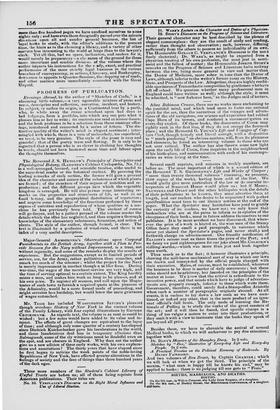Several small reprints, and reissues in weekly numbers, are before
us. The most important of which is a second edition of the Reverend T. S. Geterseawe's Life and Works of Cowper ; " more than twenty thousand volumes" (meaning, we presume, 2500 copies of the work), having been sold of the first. We would gladly give more particulars if the law or its oracular in- terpreters at Somerset House would allow us ; but if Messrs. SAUNDERS and OTLEY and the other bibliopoles wish the details of their publications to be known, they must advertise them at length, and our readers who desire to be acquainted with pocket specificalities must turn to our literary notices at the end of the paper. What the Spectator may heretofore have paid to gratify the curiosity of its readers, we know not; we only know that booksellers who are at the pains to inform us in epistles of the cheapness of their books, must in future address themselves to our publisher. It is by mere accident we have discovered, that when- ever the price of a-work is hinted at, the wise men of the Stamp Office fancy they smell a paid paragraph, (a nuisance which never yet stained the Spectator's pages, and never shall,) and forthwith charge an advertisement. Our friendly notification of ELLIOTT'S reissue cost us three times the price of the Part; and we fancy we paid cighteenpence for our joke about Mr.COLBURS1.3 shilling-wortbs,—which was more than jest and book together were worth.
Thus much as to the fact ; it however illustrates a principle, showing the mill-horse mechanical sort of way in which our laws are drawn. and interpreted by the official people charged with their execution. Rules, of course, must be established, wherever the business to be done is matter of daily occurrence ; but these rules should not be arbitrary, but founded on the principles of the matter at issue. We know that the critical is subordinate to the inventive power, and that minds which have to judge of advertise- ments are, properly enough, inferior to those which write them. Government, therefore, could surely find a Stamp-office Aristotle when such a number of paragraphic originals abound. At all events, it is useless to lay down a law such as we have men- tioned, or indeed any other, that is the mere product of an igno- rant official's dull brain. The only mode of learning the Ra- tionale of Pulling is to study the works of the great masters of the art; and it will then be found, that specific charge is a thing of too vulgar a nature to enter into their productions, or they omit it with a view to insinuate that the books they speak of are beyond all price.


























 Previous page
Previous page